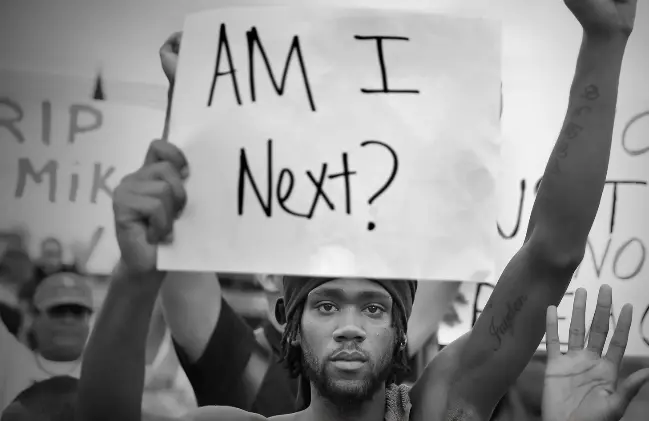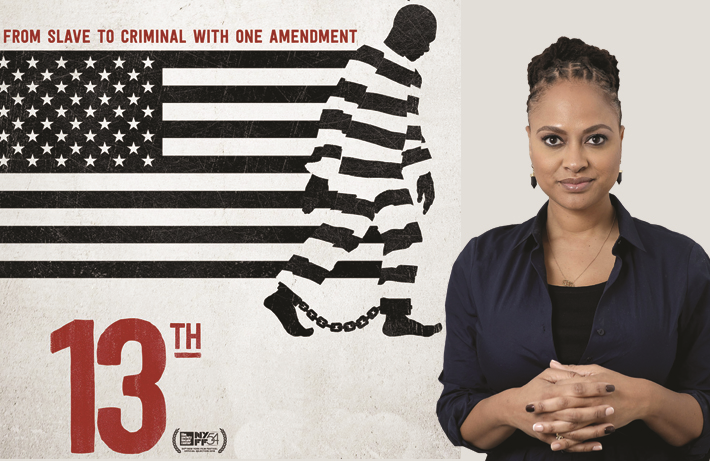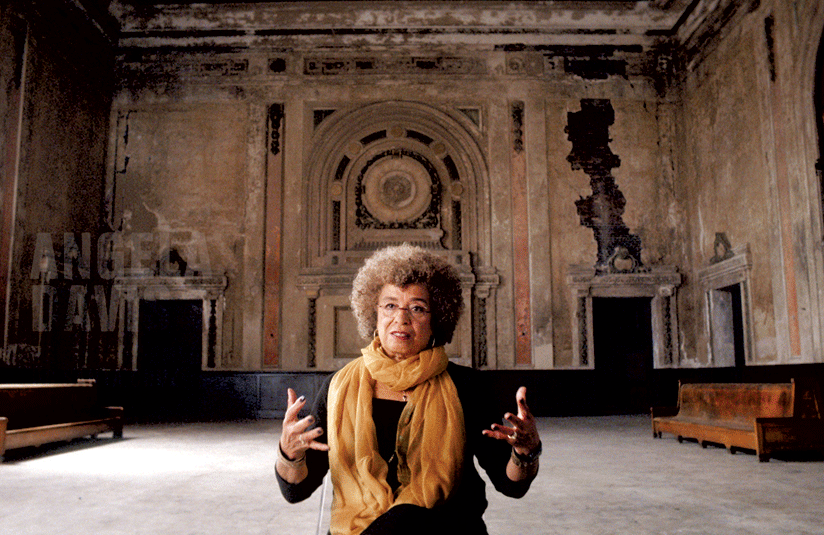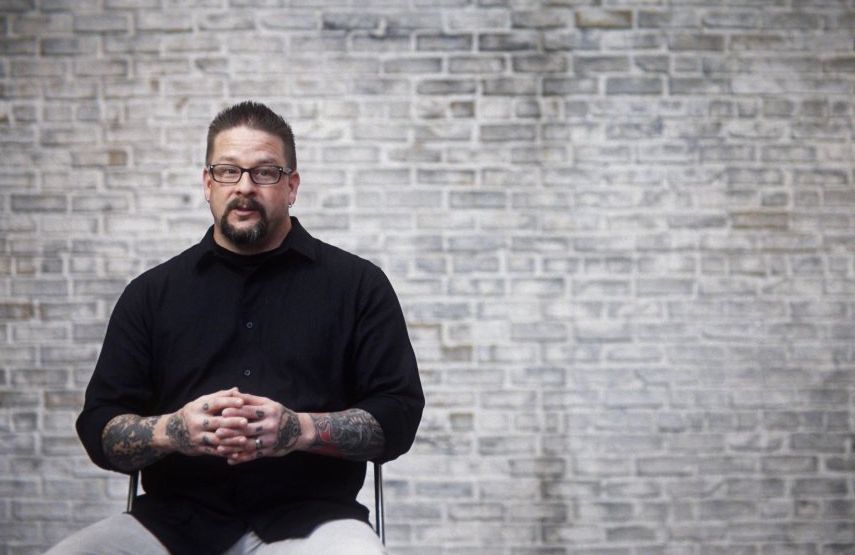What? You Still Haven’t Watched 13TH?
-
 An image from the trailer for Ava DuVurnay's documentary, 13TH (Netflix)
An image from the trailer for Ava DuVurnay's documentary, 13TH (Netflix)13TH
Watch on NetflixLast year during a book study of Michelle Alexander’s The New Jim Crow at our church, I asked how many in the room had Netflix. Almost every hand went up. Then I asked how many people had watched 13TH. No hands went up.
I launched into an impassioned call to action. If you want to see the arguments in The New Jim Crow brought to life and given historical perspective, you must watch Ava DuVernay’s Oscar-nominated documentary. Oprah loved it, so will you! Heads nodded appreciatively.
Three weeks later I asked the same group how many had watched 13TH. One hand went up.
The Bible says a prophet isn’t welcome in his hometown. But I’m no prophet, just a former full-time TV critic who spent the past six years writing, publishing, and speaking on American history. And I’m devoting this edition of The Overlooked to 13TH, a breathtaking film by an accomplished black female director that almost no white person I know has watched — despite the fact that all you have to do is turn on Netflix and search for the number 1.

History, like television, is all about storytelling. And what I’ve observed over the years is that people gravitate to stories about people like themselves, preferably stories with happy endings. That’s why we’re endlessly fascinated by the Civil War, a rollicking epic involving many of our ancestors where even the losers were covered in glory. And it’s why hardly anyone is interested in what happened after the Civil War, when the rights and protections written into the 13th, 14th, and 15th Amendments were effectively erased by Congress, the courts, the states, and local citizens’ councils. (Which our great-great-grandparents would never have supported.)
Our brains have a way of removing the ugly objects from our memory shelves, leaving only the pretty things. That’s fine if the memory is of a loved one with whom you had a complicated relationship. But white America’s selective memory has real-life consequences for millions of our fellow citizens. How we view a whole host of current issues, from voting laws to immigrant rights, is shaped by how we look at our country’s racial past. A growing number of people across the political spectrum are realizing this and taking ownership of that oft-overlooked history.
As told by DuVernay’s documentary, that history is as follows:
The 13th Amendment to the U.S. Constitution, passed in the final weeks of the Civil War and the Lincoln movie — er, presidency — abolished the slave system that had created half of all Southern wealth before the war. No sooner was it ratified, however, than white officials in the South went to work undermining the amendment using its own words, specifically the clause whereby a person’s civil rights could be denied “as a punishment for crime.” Beginning with Jim Crow laws, which eventually spread to the Northern and Western U.S., the criminal code started to be written and enforced in ways that kept catching disproportionate numbers of non-whites in their dragnet.
13TH argues persuasively that the two campaigns in our history to bring people of color into social equality — the Civil War and the civil rights movement — were then followed by waves of mass incarceration targeting these same people.

It’s chilling to see how easily the majority race fell into shaming and blaming the minority race. Historians at Ivy League schools spent decades explaining away Jim Crow as the unfortunate but understandable response to the intrusion of illiterate, unqualified Negroes into the political process. Audiences flocked to Birth of a Nation, which made the scholarly argument entertaining.
The new Jim Crow emerged with almost the same ease as the old Jim Crow — first as a “law and order” crusade, then a “war on drugs” and later, a war on “super-predators.” 13TH shows how in both the 19th- and 20th-century versions, mass incarceration was propelled and justified by economic and political forces that were, in turn, guided by the invisible hand of white supremacy.
I consider myself fairly well versed both on current events and the Civil War era. So why was 13TH such a shock to my system? I credit the skilled storytelling by DuVernay and her team. They’ve taken the dry details of the Reconstruction era and Alexander’s compelling but legalish writing in The New Jim Crow and given them firepower and urgency.
For a film so reliant on talking heads, 13TH really moves. It’s a parade of all-star provocateurs, including author Bryan Stevenson, left-wing icon Angela Davis, and even Newt Gingrich, who recants his support for the harsh sentencing guidelines passed under his watch in the 1990s. (Though Newt likely calculated that appearing in 13TH would make Bill Clinton — shown here in clips angrily defending his use of “super-predator” 20 years after the fact — look even worse.)

But it is a relative unknown, a white professor in Iowa named Kevin Gannon, whose words open and frame this film. “We are the products of the history our ancestors chose … if we’re white,” Gannon says. “If we’re black, we’re the products of the history that our ancestors most likely did not choose.”
For white Americans, watching 13TH involves a degree of surrender. We must relinquish control over the narrative and allow these storytellers of color to walk us slowly, painfully, through 150 years of our shared history. Only then can we see how the mass incarceration crisis was but one mutation of a highly adaptive virus called white supremacy that has been with us since the origins of the republic.
Woodrow Wilson reportedly said after viewing Birth of a Nation that it was “history written by lightning,” and that’s a good way to describe the emotional wallop of 13TH. Like the display of Emmett Till’s open casket at the National Museum, it is designed to shake its viewers to the core. 13TH has been described as the latest exercise in liberal guilt (or “staying woke,” take your pick). In fact, it’s a diagnosis of severe historical myopia, and an urgent plea that if white Americans start to see the past more clearly, they’ll be amazed how different the future looks.
Aaron Barnhart has written about television since 1994, including 15 years as TV critic for the Kansas City Star.
TOPICS: Ava DuVernay, Netflix, 13th, When They See Us, Documentaries
- TV Today: Queen Sugar Says Goodbye After 7 Seasons, Casey Anthony Tells Her Story
- Netflix Scraps Multiple Animated Series, Including Ava DuVernay's Wings of Fire
- TV Today: The CW's Naomi Wraps Season 1, Netflix Bows Workin' Moms Season 6
- On HBO Max's DMZ, great acting can't overcome numerous plotholes